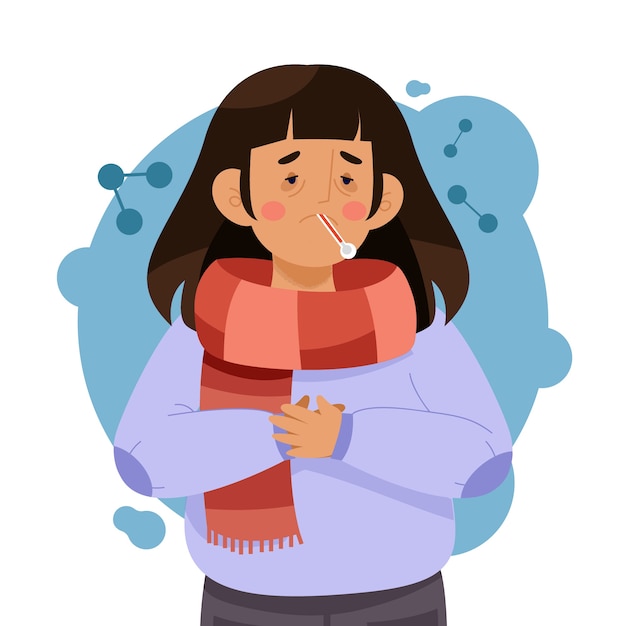Winter may bring images of cozy fires, warm sweaters, and snow-covered landscapes, but for many, it also brings a different set of challenges – winter allergies. While pollen allergies may be less common during the cold months, other allergens can thrive indoors due to reduced ventilation and increased time spent inside. In this blog post, we’ll explore five common winter allergies to watch out for and provide some tips on how to manage them.
1.Dust Mites
Dust mites are microscopic arachnids that thrive in warm, humid environments, making our homes the perfect habitat for them. They feed on skin cells, pet dander, and other organic materials. As we spend more time indoors during the winter, the increased exposure to dust mite allergens can trigger symptoms such as sneezing, runny or stuffy noses, itchy or watery eyes, and skin rashes in sensitive individuals.
How to Manage Dust Mite Allergies:
- Use allergen-proof pillow and mattress covers.
- Wash bedding, curtains, and rugs in hot water regularly.
- Keep humidity levels in your home below 50% to deter mite growth.
- Vacuum carpets and upholstery with a HEPA filter-equipped vacuum cleaner.
- Consider using an air purifier with a HEPA filter in your bedroom.
2.Pet Allergens
Winter often means spending more time indoors with our furry friends, but for those with pet allergies, this can be problematic. Pet allergens are proteins found in a pet’s skin cells, urine, and saliva, and they can become airborne or settle on surfaces, triggering allergic reactions in sensitive individuals.
How to Manage Pet Allergies:
- Create pet-free zones in your home, like your bedroom.
- Bathe and groom your pet regularly to reduce allergen levels.
- Vacuum frequently with a HEPA filter vacuum cleaner.
- Wash pet bedding, toys, and other accessories regularly.
- Consider using high-efficiency particulate air (HEPA) filters in your HVAC system or air purifiers.
3. Mold Spores
Mold can be a significant concern in the winter, especially in damp or poorly ventilated areas of your home. Mold spores can become airborne and lead to respiratory symptoms like coughing, wheezing, and nasal congestion. Prolonged exposure to mold can even lead to more severe respiratory issues.
How to Manage Mold Allergies:
- Keep indoor humidity levels below 50%.
- Fix any leaks or water damage promptly.
- Use exhaust fans in kitchens and bathrooms to reduce moisture.
- Regularly clean and disinfect areas prone to mold, such as bathrooms and basements.
- Consider using a dehumidifier in areas with high humidity.
4.Indoor Pollutants
During the winter, we tend to keep our homes tightly sealed to conserve heat, which can lead to the accumulation of indoor pollutants. These pollutants may include tobacco smoke, household cleaning products, and fumes from heating appliances. Inhaling these substances can irritate the airways and exacerbate allergy symptoms.
How to Manage Indoor Pollutants:
- Ensure proper ventilation by periodically opening windows for fresh air.
- Avoid smoking indoors, and ask guests to smoke outside.
- Use eco-friendly, low-VOC cleaning products.
- Regularly service and clean heating appliances to prevent the buildup of pollutants.
- Consider using air purifiers to filter out indoor pollutants.
5.Winter Allergic Rhinitis
Winter allergic rhinitis, sometimes called “winter hay fever,” is triggered by allergens commonly found during the colder months. One common culprit is indoor mold spores, but other triggers include tree and grass pollen that can be carried indoors on clothing and shoes. Symptoms include sneezing, a runny or stuffy nose, and itchy, watery eyes.
How to Manage Winter Allergic Rhinitis:
- Keep windows and doors closed during peak pollen times.
- Change and wash clothes and shoes after spending time outside.
- Shower and wash your hair after outdoor activities.
- Use saline nasal rinses to clear allergens from your nasal passages.
- Consult an allergist for allergy testing and personalised treatment options.
Winter allergies can be just as troublesome as their more famous spring and summer counterparts. To enjoy the colder months without suffering from allergy symptoms, it’s important to identify and manage your specific triggers. By taking steps to reduce exposure to common winter allergens and seeking medical advice when needed, you can stay comfortable and healthy throughout the season. If you suspect you have winter allergies, consider consulting with an allergist who can provide guidance on diagnosis and treatment options tailored to your needs. With the right approach, you can enjoy all the delights of winter without the misery of allergies. Looking for allergy treatment in Faridabad? Try Sarvodaya Hospital, where compassionate care meets cutting-edge medicine. Sarvodaya team is dedicated to your well-being, ensuring a comfortable and effective path to recovery.





